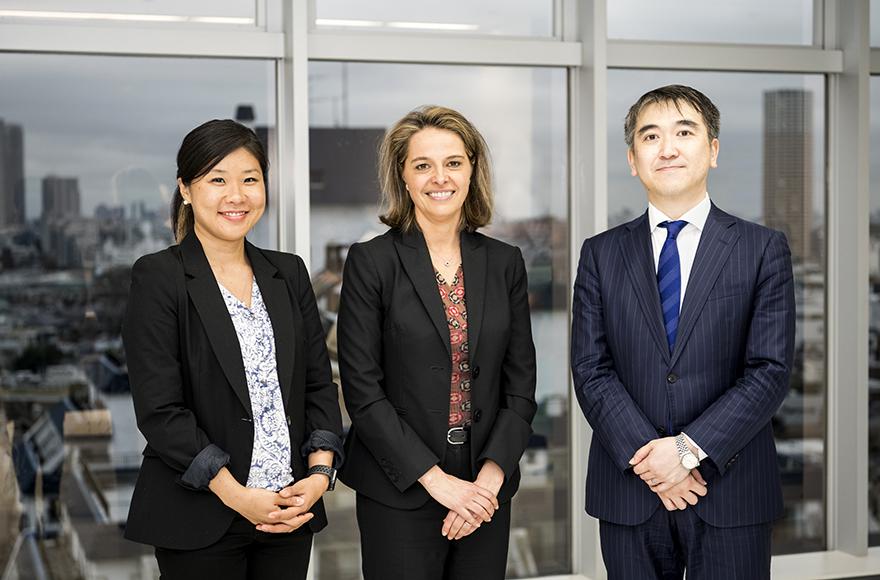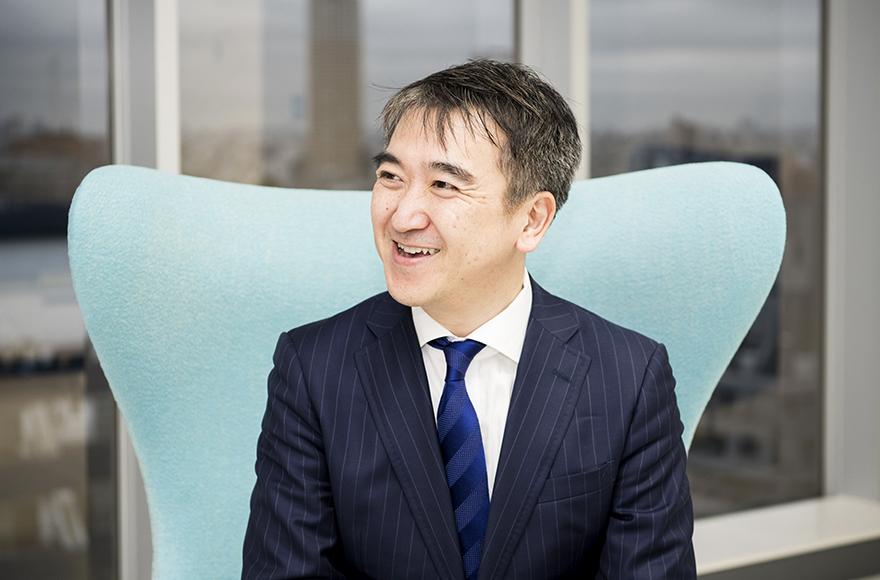HENNGE’s Culture Map

We recently published H’s Culture Map. This interview started out as an internal interview, and as a company who values transparency, we decided to share it with the world.

My pleasure too. Well, hmm just quickly looking at these, I see that you have a kind of a typical, technical, young tech environment. You are always looking different from traditional Japanese companies. But I think it’s similar to the kinds of things that’s seen in other young tech companies.


So, our company started in 1996 and until 2014 almost all of our employees were Japanese. From 2014, we began to hire members from overseas. he number of foreign members increased and today we have 23 non-Japanese members, of course Japanese are the majority at 177, and Indonesia comes next, Thailand, Malaysia, China, U. S. A., Columbia, Swiss and Korea.

Very good. And these people, you brought them to Japan or they were already in Japan?

Some were already in Japan studying and so we initially hired them as interns or part timers. And some we actually did hire from overseas.

For my challenge, I analyzed ourselves according to your book.

Your corporate culture. OK, this is what I want to hear. “Who are you?” in my own language.

Let me show you this. These are pictures our employees.

They look very beautiful.

We had a professional photographer come in.

First, for Communicating, Japan and China are High context and leaning towards the same range.. And Evaluating is near IndireI. Persuading, I guess we are in the center, and for Leading, even though we are a Japanese company, we are leaning towards Egalitarian.

This is your industry. Technology tends to be toward that end.

And for Deciding, we are Consensual and still very Japanese. So again, in spite of being a Japanese company, for Leading, we are Egalitarian.

Because of the leadership, this is what the leadership has modeled. Maybe the founders were trying to set up an environment that was more egalitarian.

Yes, we are anopen source culture so we find that the Egalitarian is comfortable for us.

So, we have four questions. Are there any companies like us, that has same traits as Japan but with Egalitarian Leading style?

Erin Meyer
Erin Meyer is a professor at INSEAD, one of the world’s leading international business schools. Her work focuses on how the world’s most successful global leaders navigate the complexities of cultural differences in a multicultural environment. Living and working in Africa, Europe, and the United States prompted Meyer’s study of the communication patterns and business systems of different parts of the world. Her framework allows international executives to pinpoint their leadership preferences, and compare their methods to the management styles of other cultures. Her work has appeared in Harvard Business Review, Singapore Business Times, and Forbes.com. In 2013 Erin was selected by the Thinkers50 Radar list as one of the world’s up-and-coming business thinkers. She is the recipient of the 2015 Thinkers50 RADAR Award.

Well the company, uh, country that comes close is Sweden. Let me show you, Sweden matches you here, and matches here, So Sweden and Japan are similar always because they are more consensual. And Sweden are also… let me show you the disagreeing scale, so here also you can see Sweden, out of all the western countries it is the one that’s furthest to the right. And there is another dimension, which is not my usual eight dimension but do you remember that one I showed this morning? The comfort of silence, do you remember that? Japan is very comfortable with silence and Sweden also is more comfortable with silence. But Sweden is more direct with negative feedback. And Sweden is about here on this scale. So, there is no…Japan is already a very unique culture. There is no other country in a world that has the same map as Japan does, so detect the Japan map and put the egalitarian… that’s only you!

So, before we move on to next question, would you like to tell me about any of these dimensions that are challenging to you as a company?

Well, I guess here, in Leading… some managers’ behavior is more towards Hierarchical, and some managers are on towards Egalitarian. The difference of managing style cause a little bit of confusion. Our culture is moving towards Egalitarian due to increase in numbers of global members.

I see that’s challenging because most people in your company come from countries over here… people have learned to follow a lot to the authority figures… right.

This is well…High context is also difficult. Indonesian, Chinese and other Asian members has High context, but still sometimes difficult to communicate.

You are misunderstanding each other.

:I have no idea if trouble might be hidden. But I’m sure there is a difficulty because of the difference of context from each country.

People are picking up messages differently because they are from other High context countries. Ok.

Let me go on to the next question. We are continuously hiring employees from abroad and we are interested in welcoming staff from countries that we don’t have the employees yet. So, can you predict our company’s future?

You will be very wealthy.

Something might occur? Or we have to prepare for something?

Do you think when you are hiring, it will be mostly continuing to be from Asian countries or do you think it maybe also from other western countries as well?

Not only from Asian countries but also from other areas, but Asian members may have more chances to come compared to other countries.


OK. So, Predictions. As you are moving internationally, I think one of the biggest risks is that because the Japanese culture is so strong on this scale, and also so strong on this scale, this makes it easy to work with Thai people, or people from Myanmar, Myanmar is also way over here…so that’s comfortable. But if you start hiring people over here, that are on the other side, the risk is that in Japanese culture so much is unspoken. You think you are communicating a lot but other people from other cultures feel that you are being secretive, or you are hiding the information because they cannot pick up the implicit messages. That may lead to lack of trust, so that’s very common.That’s very common. People would feel like others are purposely not being open with him or her, or purposely hiding information. If you are going to hire people from Western countries, this dimension is also difficult because in Japan generally people don’t give much feedback. And feedback is provided implicitly. So implicitly that person have to understand how the others feel about his or her work. People from Europe or from US, even India will feel that they feel lost because they don’t understand what the assessment of their work is. So that’s one thing. The other thing that I think…this dimension is really important, the trusting scale. This is the most important of all of the dimensions, as you grow internationally, often what happens is Japanese may continue to go out in the evening together or socialize together and sometimes when you get people from other countries they don’t get involved in that in the same way, so the trust between Japanese are strong, but people from other countries never manage to develop the same level of trust. So, I think… would you like me to talk about the recommendation?

Yes.

OK, so, I recommend first of all, I think this is excellent you’ve done this. But I recommend you start showing your corporate culture mapped out on the scale to the company, so it doesn’t have, do you remember this morning that I showed the Netflix map? in this same way I recommend you create an HENNGE map. And that map should show your aspiration, your hopes. So, where you want the company culture to be. Your goal is that your corporate culture has this. And then human resources should talk about it frequently. So, when new employees come into the company, they get a bit of analysis as to what the corporate culture is like, what that means, so that people don’t have to walk around blind. I think that’s very important. I also think it’s very important that as you invite more people in from other countries, you talk with them about …some of the things …over here, and over here, and over here, some of those things you may need to change later. I mean this one specifically, I know this is next question, right?But this is very challenging if you have a lot of people from other countries. As you said, even if you have a lot of people from Thailand or Indonesia, those are High context cultures too but they will not understand messages in the same way. So, it can lead to a lot of miscommunication. Benefit with Thai and Indonesia are they are also very indirect, so you won’t see them getting frustrated, they won’t show it so you won’t know. But when you start having people from other countries, the communication can really breakdown. So, you might want to think abou, as a leader, trying to question when you need to be more explicit, and think about it It’s hard because you are used to communicating in a High context, you don’t even know when the assumptions are being made. But we need to get in a habit of trying to understand what things we need to make clear, what do we need to write down more, that’s one thing of that’s very common in a High context culture. We don’t write down how it works, we just know how it works. Will you talk about what made you ask this question?

I myself feel that High context communication is very comfortable. For example, out of 10 procedures that newcomers have to know, we only have to explain 2-3 procedures and most Japanese will be able to understand all 10 procedures.. It’s very comfortable and pleasant. For Japanese or people from other High context culture it’s very comfortable. We have to move on to low context, but High context is very pleasant and sweet but risky..

Hmmm, you just want to eat them!

I think I might change my concept of value, I have to move to Low context.I want to be ready for changes.

Are you thinking of giving instructions more specifically? You gave me the example, of you saying one step and there seems to be two or three steps were understood…

Yes.

So, I don’t think… This depends on what nationality you are working with. Let’s get to this Leading scale. If you have people coming in, Indonesia or Thailand, they are Hierarchical, which is opposite from your side of the scale. If you have Indonesians and Thai people coming in, they are very comfortable in receiving the clear instruction from the boss because they are Hierarchical. They are also comfortable reading between the lines. But the Egalitarian culture people don’t like being given clear instructions, they want to figure it out by themselves. Right, so my recommendation for this is not that you as the boss needs to start saying very specific and clear instructions. You don’t have to give more directions, because actually, giving direction and telling what to do is more Hierarchical. But you have to explain the context more. You have to help people understand what’s going on. So, let me give you an example. So, with an employee from one of those countries, you don’t need to say, tomorrow you need to call this person, email this person, you need to write this report. But instead, spend more time explaining this is what this person is like and this is why you set it up here, this is our goal here, this is our overall strategy, this is what I want you to accomplish. So, you need to get in the habit of explaining the context. And that takes a lot of time. It also means that at the end of the meetings, this is a big thing about being low context, you have to spend more time clarifying what has been decided, and who’s supposed to do what. That’s important. It’s annoying, it takes a long time. So often I found Japanese at the end of the meeting people just know, they just know who’s supposed to do what,. But when you have people from different countries you have to have a system, of course Japanese have great systems.You have to clarify what’s been decided. And That’s a sour pear you must eat.

Last question is from me. We do actually have bicultural or those who have extensive experience in more than one culture. You mention in your book that maybe making use of those employees to bridge the gap with other employees. Or using them and training them to teach other employees to learn, perhaps, to go, more low-context. How would you go about this? Could you give us some specific ways that HR can do that ?


People will not become cultural bridges without instruction and assistance. Just having people from other countries doesn’t do it. Because of course, first of all people don’t understand this. So, because I’m just from another country doesn’t mean I understand this. So, I come in and I feel lost. And even if I did understand that I don’t feel comfortable telling everybody you do that because you are Japanese. But I think there are simple systems you can put in place to make this happen. So, one thing I would recommend and I’ve seen many companies do, you could start for example a book club with the culture map. Maybe you invite, start with 15 people from different countries, 5 Japanese who have some international experience, and you start by every month you read the chapter of the book. And you come together as a group and talk about… “did it make sense to you?” or did you notice any differences here or in other countries”, and you begin to build up, it takes you 8 months. Or you could do it once a week if you want to, and it can take only 8 weeks. Over that period, you have an hour discussion about each dimension after they’ve read the chapter. And at the end of that time you ask those people to consider themselves responsible for helping the company to better understand these things. And you probably should also announce it. You should say “you are studying cultural diversity mentor program” and you’ve chosen some people from other countries to help everybody better understand. And you know it on and on going basis, you come together, ask “have you been talking about this?”” Have you noticed this case?”, etc. I don’t think that people will start doing this without using those systems. Someone like yourself, who is multicultural or bicultural, when you hire people like that, you should be very clear with them saying “we are hiring you partially because you can help us to better understand multicultural, you can help us to be more international”. You can also do one on one with people when you hire them. You have eight of people went through this and “you are first person from Germany, or you are the first person we hired from Saudi Arabia” and you can say so I’d like to meet with you regularly for eight weeks and I’d like you to read the first chapter of the context. And tell me what you’ve noticed in the office, how is Saudi Arabia different from Japan. And you can get people ready to start articulate it, talking about it. I think you also should slowly choose groups of Japanese people to kind of sponsor to bring into these discussions. People who would just like to raise the awareness with. If you do that, and you know I gave these links to the tools this morning, you can also have people map themselves out on this eight dimensions. You can also have the corporate culture map, I just think talking is so important. If you have a discussion going all the time about these things, then it makes things so much easier. Most often people don’t talk, they don’t talk because they don’t know the language to explain what they are going through, because they don’t feel it’s appropriate, because if they speak up it sounds like being judgmental, and therefore everyone stays quiet. It’s a very simple recommendation, but my recommendation is talk, talk, talk!

Thank you. Have you heard that other Japanese companies asking the same sort of questions?

Well, this question about high and low context is very common for Japanese. Because of course you are so used to not explaining anything, you are just so used to everyone just understanding. Japan is such a homogeneous population it’s a really unusual country for me, because it’s 97% Japanese, so I do think as you said that sweet poison, you are used to just things being understood in a way that is so on. So that’s a very common question. The last question you asked me, I haven’t heard many Japanese companies asked that questions, but everybody asks that question. I had a book club meeting over Skype with Google last week, and they are going through this process, they have a Google book club and they are working on the map and did same questions, we have people from different countries, we are trying to figure out how to get the discussion started. That’s common. But I do think, if you map out the corporate culture, and then you noticed something is fixed, something you will continue to evolve, because you might find that this year you are here and that maybe in 2002 when you had a lot more people from other countries, you might find it more over here. It doesn’t mean you have to become more low context, but it means that you have to spend a lot more time repeating things, putting them in wiring, what did you understand? what did you understand? what did you understand? what is everybody going to do, it requires much bigger time investment. Because multicultural interaction does work.

Does it equal to make our own culture? Depending on nations and their culture, we have to take time to make our own company culture?

I think you should be having that discussions about that. I think you should map out where you think the culture is today. And I think you should map out what your hope is, and how the culture will change in the future. The two of you, human resources and leadership, you should be very clear about how you are hoping to change the company, and you should be very expressive about that. So, for example, you put this up here, and you said “but some of the managers are over here.” So maybe this is your style. Maybe your style is here but you have so many hierarchical countries, the way people are behaving maybe more like here. For Human Resources, I think the goal internationally is to recognize you have your value systems. Then you will have to identify what that means behaviorally, so if you actually have a goal trying to encourage managers to be more egalitarian. That also means you have to encourage the workforce to feel comfortable challenging their bosses, and that’s not so easy. But you can say, this is an example, our hope is for everyone to be comfortable telling their boss when they disagree with him. And you, as a leader, at the end of the meeting, you say “what do you think?” Really encourage people and reward people when they don’t agree with you. Did you send me more specific questions on another list?

Well, this is just a small one, but, some global members share their salary with others. I was surprised because salary is a highly sensitive matter for Japanese.

Japanese or Southeast Asia?

Just Thai.

I think that happens. I was surprised when I saw the question because I think that sharing salary in a workplace isn’t common for any part of the world. But when you have a situation, where you have a few people from foreign countries who are working together in another culture, they have a feeling of being united. They have a feeling of being united in a foreign environment. That may lead them to share the information that they would not share at home. I don’t think in Thailand you would have that with Thai people in Thai company. But here they feel so close. The problem is that I don’t think you can tell people not to do that. Because when you say “don’t do that,” it makes it sound like you are trying to hide something, and I also believe younger generations are expecting transparency about everything. So, what I’d say is that, you, when you hire people you can say to them, that “we consider salary as private information so please keep it to yourself.” You can say that just in case, it’s obvious. You could say that to everybody, I think it will probably help, but once it happens, I guess you could explain that it could cause people to be jealous and ask people not to talk about it. You might even have, if you have three Japanese people working in a Switzerland, those three Japanese might come together and share information. So, what else do we have.

Some younger members from oversea wants to have a company trip. But in Japan, country trips has a bad image related to power harassment and sexual harassment. So, Japanese people don’t like company trip. So, we feel a gap.

I’d like to look at this trusting scale here again. I would just like to point out that Japan is the most task oriented of Asian countries. Thailand and Indonesia are way to the right to japan, and in Thailand, Indonesia, Myanmar, all of those countries as well as Colombia, they are very very strong relationship oriented countries. Which means that people are really focused on developing personal connections. In a work environment, it’s very common for people to share a lot of long meals together, talk a lot about their families one another and really get to know each other very well. I think in Japan, people usually are more task oriented during the day, and in the evening, you would go out…Do you guys do that?

No, we don’t do that.

Ok, you don’t do that. You guys are shifting over here, you are following the tech industry, right? That’s generation gap in Japan. Thailand and Indonesia are way over here and all of those Asian populations are way over here. It’s also very common in China to have this kind of work trip, to have lots of outside of socializing. I personally think it’s very important that you establish these very strong relationships when you have people from other countries. Because if you have the strong emotional bonds, when there is misunderstanding, people forgive each other. But if we don’t have that bonds, if you are operating in a more task oriented way, if you don’t know about your family and you as a person, didn’t laugh together, cry together, drink together, I don’t feel that bond with you. And if I feel that you didn’t share information in a meeting, and then I will really take it personally. So you don’t need to have a work trips, but when people ask you for work trips, they are asking you for is to develop a culture where people can know each other better. And I actually recommend you to do that. I recommend you try to find other ways. ry to encourage the environment where you have an hour long lunch every day or people just sit down and spend time together. Maybe you try to do something more traditional Japanese and go out and have this meals, people likes to drink together. I think that will help all of countries over here to feel more trust with you. Actually, I think it’s most important thing.

Last question is about Englishnization. Two years ago, our common language changed to Japanese to English. It’s still in progress, but does Englishnization bring shift in our company culture?? What do you think?

I don’t recommend you try to force Japanese people speak English with Japanese people. I think that leads more miscommunication You know it’s difficult to operate in a language that’s not your own. So I don’t think you want to push that. Of course, when people are speaking a language that’s not their own, we have more misunderstanding. That happens all the time, of course we do. Because we don’t have the same subtlety of tool to express ourselves. So as you move to meetings, to have more meetings in English, conversations are in English, just goes back to the points. You will also need more low context processes, you need more “what did you understand?” more write down “who’s supposed to do what,” so that everybody understands what’s going on and what the decision is… I don’t really have any other recommendations with this. I think what you’re doing is good, the way you have, you were showing me the some of the meetings are in English, and some of the meeting are in Japanese. I don’t think you could do any better than that.

One more question. This is just my question. In Japan’s salary system, bonus is big part of your salary. It’s basic and common like base salary in Japanese companies. But I have a feeling that it isn’t in other countries?

In Japan, do people always get bonus?

If you are permanent, yes.

Yes, that’s definitely cultural. Some cultures have almost no bonuses. Other culture bonuses are not very common, bonuses are guaranteed mostly in other countries for only 10% of people. So challenge is… in Japan, the bonuses ares also not based on performance. So that’s the problem. In most countries, bonuses are really like you might get it or you might not get it. And because people have that assumption, they are not comfortable having it to be the major part of their salary. They want to know it’s guaranteed. Now if you are comfortable being explicit about that, and saying It’s a bonus you can get it. You can count on it. Then people can go along with that system. That’s very specific. I want to say one another thing with these different questions which is that I think, along with talk talk talk, these are the kind of the things you guys should be talking about in the company. Asking people these things all the time; how does the bonus system work in your country? what about the company trip in your country? So people are really talking about these things a lot. Because you must have this knowledge here, although I know many of your employees come in are young. All of those things are complicated. But that’s why you can do more relationship building. Because that’s when people will start being more open, when feel they have a close relationship with you. I just want to make one more comment. Japan traditionally is quite relationship oriented, but the last generation is moving over here. So where is these countries they build relationship over lunch time all through the day and in the evening, Japanese always work, work, work in a day time and build relationships at night. And now a Japanese are getting laid of the night time events, which means shifting over here, that means they are not providing this type of personal connections that Asians in general other Asian countries expect to have in work environment. So, you need to start acting like your grandparents.

You know Japanese company very well!

Thank you! Good luck with all of this, best of luck it’s a very exciting process you are going through I predict your future. I predict you will be very successful! Thank you.
Thank you very much for taking your time today. We are very excited to have you here with us. We were looking forward to talking with you and have prepared some papers here.